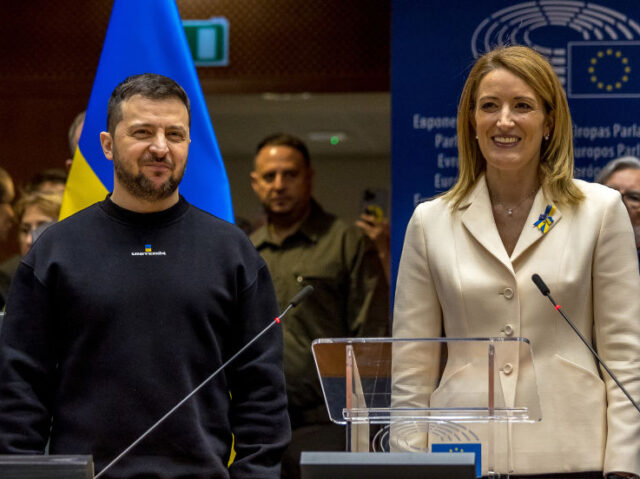The European Union should match Ukraine’s ambitions and accelerate its membership of the bloc by starting formal talks on that process this year, the President of the European Parliament has said.
Maltese politician Roberta Metsola, who became one of the European Union’s three presidents as President of the European Parliament last year has told British left-wing newspaper The Guardian there should be “nothing off the table” in terms of preparing the ground for Ukraine to become a member state of the bloc.
Typically, joining the European Union is a process that takes years as applicants gradually implement European rules, harmonise with the internal market, and meet key requirements on the rule of law, democracy, human rights, and other areas. But much of this should be set aside to get Ukraine in quicker, Metsola said, remarking on Kyiv’s eagerness to become a member: “If they are going fast, we should match that speed”.
To enable this, the President said she “expected member states to begin formal negotiations with Ukraine as soon as December,” The Guardian reported.
EU President on Ukraine: 'They Belong to Us… We Want Them In' https://t.co/mrOjRtBEQZ
— Breitbart London (@BreitbartLondon) February 28, 2022
Some key areas that could otherwise hold up a new Union member — like robust rules on corruption — may prove difficult, but others have practically already solved themselves. Trade tariffs between the EU and foreign states were dropped for Ukraine as part of a package of wartime support last year, which has led to surging agricultural exports to the bloc.
Open borders with new members have often proven a sore point in the past, but Ukraine has had functionally open borders with Europe since last year — for women and children at least — with millions of Ukrainians already having migrated West in recent months, taking the sting out of that tail.
Warning there are consequences to slow-walking membership, identifying this risk in her view as increasing “the extremes on the political spectrum, the Euroscepticism”, which The Guardian interprets as “nationalism and the far-right”, Metsola said failing to get membership talks underway before Christmas would send “the worst signal”.
In this regard, her remarks are in line with those reported earlier this month by France’s EU minister Laurence Boone, who said a slow membership process would give Russia the opportunity to undermine confidence in candidate states, and in Ukraine’s case, even invade as the state exists in limbo between accession talks and actual membership.
Putin Now in a ‘War Against NATO and the West’ in Ukraine, Claims EU Official https://t.co/UpCDAQ8r6y
— Breitbart London (@BreitbartLondon) January 28, 2023
Ukraine benefits from apparently unanimous agreement among top European Union leaders that it should become a member state, even if convincing every present member state that they agree to admit a state party to an active conflict with Russia. As well as European Parliament President Metsola, Commission President Ursula von der Leyen has labelled it the “call of history” when saying “the future of Ukraine is in our Union” this month.
The third European President — Charles Michel, the Council President — has also signalled his support, but was more circumspect with his remarks, saying it would happen before the end of the decade. He said in August: “We must set ourselves a clear goal. I believe we must be ready — on both sides — by 2030 to enlarge. This is ambitious, but necessary. It shows that we are serious… Integrating new members into our union won’t be easy. It will affect our policies, our programmes, and their budgets. It will require political reforms. And political courage.”
Ukrainian President Volodymyr Zelensky has, of course, also voiced his calls for Ukraine to join the bloc, but that is not the only organisation he has staked a claim on. Earlier this month, while speaking in Kyiv, Zelensky said “Ukraine needs the highest possible level of international coordination”, asserting that in his view “Ukraine is already a de facto member of NATO” and should push ahead with the strategic task of “integrating Ukraine” into the alliance.
Zelensky Sacks Six Deputy Defence Ministers Amid Mounting Corruption Scandalshttps://t.co/y2oI6I3EWx
— Breitbart London (@BreitbartLondon) September 18, 2023

COMMENTS
Please let us know if you're having issues with commenting.